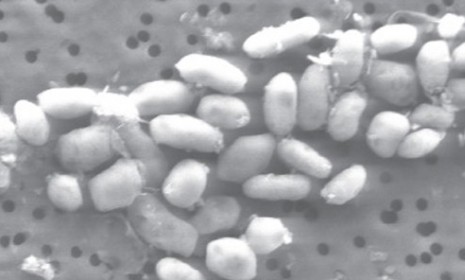NASA's new life form: Underwhelming?
Scientists have found an organism unlike anything else on earth — triggering great excitement in certain quarters. But was the discovery oversold?

A free daily email with the biggest news stories of the day – and the best features from TheWeek.com
You are now subscribed
Your newsletter sign-up was successful
NASA has discovered a new form of life. No, it's not an alien, but a new kind of organism here on earth. Scientists have long assumed that six "building blocks" are essential for life: Carbon, hydrogen, oxygen, nitrogen, sulphur, and phosphorous. But NASA has discovered a microbe in California's Mono Lake that can use arsenic, not phosphorous, as one of its six "blocks." Given the hype over NASA's announcement, some were nonplussed by the news. What's the real significance of this discovery?
It changes everything: This is an enormous deal, says Jesus Diaz at Gizmodo. Every science textbook ever written will tell you that every being on earth, "from the smallest amoeba to the largest whale," is made of the same elements. "But not this one." This changes "our understanding of life itself."
The Week
Escape your echo chamber. Get the facts behind the news, plus analysis from multiple perspectives.

Sign up for The Week's Free Newsletters
From our morning news briefing to a weekly Good News Newsletter, get the best of The Week delivered directly to your inbox.
From our morning news briefing to a weekly Good News Newsletter, get the best of The Week delivered directly to your inbox.
And could make the search for alien life easier: This brings us another step closer to finding alien life, says science fiction author Robert Sawyer, as quoted on Fox News. NASA's probes have always looked for extraterrestrial life that "matches our biology." Now that we know there's "more than one recipe that makes life," we can broaden our search to include arsenic-based organisms. "It's a huge breakthrough."
"Are aliens among us? Sort of, NASA says"
Still, I feel like I was tricked: When word spread that NASA might have discovered "a new form of life," says Tony Ortega at the Village Voice, I was expecting more. "Where did it come from? Outer space? A parallel line of evolution? Exciting! Exciting! Throw out yer Bibles, people!" Turns out it comes from... California. How underwhelming.
A free daily email with the biggest news stories of the day – and the best features from TheWeek.com
NASA overhyped this: It's no wonder some are disappointed, says Phil Plait at Discover. Touting this announcement as something "that will impact the search for evidence of extraterrestrial life" set off over-the-top speculation. Anything that wasn't "a black hole right next door or actual life on Mars" would have seemed like a letdown.
"Snowballing speculation over a NASA press conference"